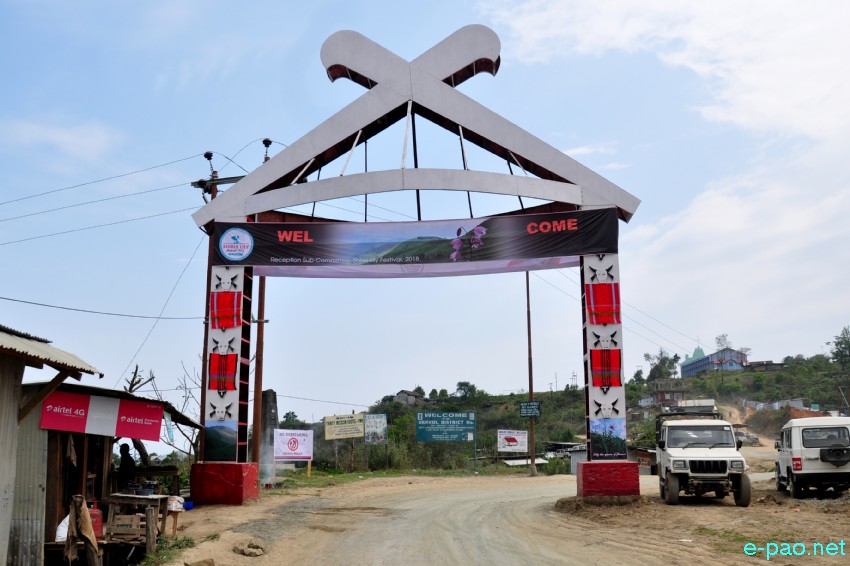Alarming climate shifts in Ukhrul
- A call for awareness and action -
Addie Chiphang *

A view of Ukhrul Town in April 2018 :: Pix - Shankar Khangembam
UKHRUL, known for its serene landscapes and vibrant cultural heritage, has recently been experiencing significant climatic changes that are raising concerns among its residents.
The district, which once enjoyed a moderate climate, is now witnessing unusual weather patterns, including increased heat waves, erratic rainfall, and a noticeable shift in seasonal cycles. These changes are not only affecting the environment but also the livelihoods and health of the local population.
One of the most significant observations comes from Qr. Yarchung, a nonagenarian resident, who reflects on the past and expresses concern over the apparent aging of the Earth. He emphasizes that the signs of climate change are evident to anyone who observes the changes in weather patterns and environmental conditions.
"The earth is getting old, and it is known not only by scientists but by all sensible people. We need to guard, protect, and take necessary measures to adapt to these changes," Yarchung states, highlighting the urgent need for collective action.
The district's major environmental challenges include deforestation, soil erosion, and the destruction of natural habitats. Temporary farmings, Jhum cultivation, a traditional method of slash-and-burn agriculture, has been particularly detrimental, leading to the loss of vast forested areas. This practice, combined with the pressures of urbanization, has exacerbated the vulnerability of the region to climate-related disasters such as landslides and floods.
A stark example of human impact on the environment is the sand quarrying activities along the Ukhrul-Imphal road (NH-202A) particularly in Hungpung. Social activist Eno Ramkhayei points out that while sand quarrying provides a livelihood for some families, it has led to severe environmental degradation.
Recently, landslides blocked the Ukhrul-Imphal road, a consequence of unchecked quarrying activities that have destabilized the terrain. Ramkhayei warns that without proper regulation and environmental conservation efforts, such incidents are likely to become more frequent and severe.
Ukhrul's vulnerability to natural disasters is further compounded by its geographic location. The district is prone to earthquakes, flash floods, and landslides, all of which are exacerbated by climate change. The region's climate, influenced by the South-West Monsoon in summer and the North-East Monsoon in winter, is experiencing shifts that disrupt traditional agricultural practices and affect food security.
Awo Hormi of Hunphun, an octogenarian farmer, recalls a time when the farming seasons were predictable "Luisao- Luishom".
"Ten to fifteen years ago, paddy planting began in May, (Rayi-Lui) with terrace paddy fields being prepared and complete planting by 2 week of June ( Akang Lui/ Ramsha). However, in the last 4-5 years, the rainfall patterns have become erratic, disrupting our traditional planting seasons," Hormi laments.
This unpredictability in weather patterns has made it challenging for farmers to maintain their livelihoods, further highlighting the urgent need for adaptive strategies in agriculture.
Water and air pollution, waste management issues, and deforestation are critical environmental problems in Ukhrul and the neighboring Kamjong district. The exploitation of natural resources, such as timber and minerals, has led to habitat loss and biodiversity decline. The district's flora and fauna are under threat, with some plant species facing the risk of extinction due to over-exploitation and habitat destruction.
The broader implications of climate change in hilly regions like Ukhrul include increased frequency and intensity of extreme weather events such as storms, landslides, and rockfalls. These events pose significant risks to infrastructure and livelihoods, necessitating comprehensive disaster preparedness and response strategies.
Human activities have significantly altered the mountain ecosystems, with deforestation and land use changes contributing to soil erosion and habitat fragmentation. The improper disposal of waste and lack of adequate sewage treatment facilities have led to pollution of land and water bodies, further degrading the environment.
Addressing these environmental challenges requires a multi-faceted approach. Public awareness and education are crucial to fostering a culture of environmental stewardship. Lo- cal communities must be engaged in conservation efforts, and sustainable prac- tices should be promoted in agriculture, forestry, and waste management.
Government policies and regulations play a critical role in mitigating environmental degradation and adapting to climate change. There is a need for stricter enforcement of environmental laws, particularly concerning land use and resource extraction. Additionally, investments in infrastructure that can withstand extreme weather events, such as flood-resistant roads and buildings, are essential.
The relationship between climate and the environment is intricate and interdependent. Changes in climate patterns affect the growth and behavior of plants and animals, altering ecosystems and the services they provide. As habitats change, so do the interactions within them, affecting biodiversity and ecosystem stability.
The environmental and climatic challenges facing Ukhrul require immediate attention and action. The district's residents, Government, and civil society must collaborate to develop and implement strategies for sustainable development and climate resilience.
By promoting awareness and preparedness, Ukhrul can adapt to the changing climate and protect its unique natural heritage for future generations. The time to act is now, before the consequences of inaction become irreversible.
(This Article is written under the joined initiative of Media Resource Centre, Directorate of Environment and Climate Change, GOM and Ukhrul District Working Journalist Association)
* Addie Chiphang wrote this article for The Sangai Express
This article was webcasted on August 05 2024.
* Comments posted by users in this discussion thread and other parts of this site are opinions of the individuals posting them (whose user ID is displayed alongside) and not the views of e-pao.net. We strongly recommend that users exercise responsibility, sensitivity and caution over language while writing your opinions which will be seen and read by other users. Please read a complete Guideline on using comments on this website.







